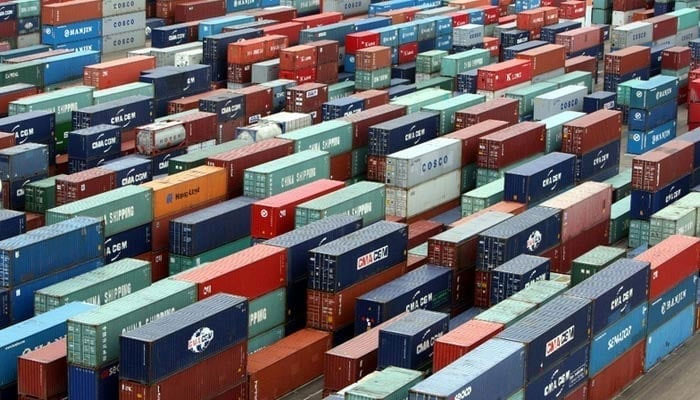Food exports halt as authorities act against DPP officials
KARACHI: Pakistan’s food exports, primarily dry food items, and imports have come to a standstill since Friday following the Federal Investigation Agency’s (FIA) action against the Department of Plant Protection (DPP) and the arrest of several officials.
The issuance of phytosanitary certificates -- mandatory for exporting or importing plants and plant products -- has been suspended, effectively halting the movement of goods. These certificates confirm that the consignments are pest- and disease-free.
According to the Trade Development Authority of Pakistan (TDAP), the country exports approximately $6.5 billion worth of food items annually, with rice exports suffering the most significant impact.
The crackdown follows an inquiry ordered by Prime Minister Shehbaz Sharif after a consignment to the European Union (EU) earlier this year was found to contain genetically modified organisms (GMO), violating EU regulations. The strict action was ordered by the PM in a meeting on the issue this week.
Action has been initiated against 17 DPP officials (entomologists), accused of issuing 40 phytosanitary certificates for rice consignments to the EU without fulfilling legal requirements. These officials issued a total of 46 certificates in this year. Director General of DPP Tariq Khan has been suspended, and Shahid Abdullah has been appointed as acting DG DPP. Sources said that around nine officials have been arrested.
The suspension of certificates has severely disrupted rice exports. Exporters have been forced to return shipments from ports to warehouses, as rice consignments are heavy cargo, sources said.
Vice Chairman of the Rice Exporters Association of Pakistan (REAP) Jawed Jillani confirmed that no phytosanitary certificates were being issued, halting exports since Friday. “REAP is not a party to this issue. The government is taking action against its department,” he said, expressing hope that the situation would resolve by Monday with ministry support.
Former REAP Chairman Rafique Suleman criticised the stringent measures, arguing that only one consignment faced interception due to prolonged shipping times. “Pakistan’s cargo interception rate is less than 1.0 per cent, which is negligible compared to other countries,” he said. He added that halting exports even for a single day is damaging, especially with a vessel scheduled for Indonesia and an Indonesian delegation visiting Pakistan.
Zulfiqar Thaver, president of the Union of Small and Medium Enterprises (UNISAME), expressed concern over the plight of SMEs. “The inquiry should proceed, and strict action should follow, but the work must not stop,” he urged.
However, Waheed Ahmed, patron-in-chief of the Pakistan Fruits and Vegetables Exporters, Importers, and Merchants Association (PFVA), revealed that phytosanitary certificates are still being issued for fresh fruit and vegetable exports at airports, allowing at least some exports to continue.
-
 Fukushima Decommissioning: Japan Deploys Snake-like Robot To Remove Nuclear Debris
Fukushima Decommissioning: Japan Deploys Snake-like Robot To Remove Nuclear Debris -
 Brenda Song Turns Macaulay Culkin's 'Home Alone' Into 'terrible' Lesson: 'Children Have To Be A Little Scared'
Brenda Song Turns Macaulay Culkin's 'Home Alone' Into 'terrible' Lesson: 'Children Have To Be A Little Scared' -
 MrBeast Vows To Book Only Starlink-equipped Flights As Global Airline Adoption Surges
MrBeast Vows To Book Only Starlink-equipped Flights As Global Airline Adoption Surges -
 Kim Jong Un Says North Korea Ready To ‘get Along’ With US But Sets Key Condition
Kim Jong Un Says North Korea Ready To ‘get Along’ With US But Sets Key Condition -
 Andrew Fears What Comes Next As Jeffrey Epstein Scandal Deepens
Andrew Fears What Comes Next As Jeffrey Epstein Scandal Deepens -
 Inside Meghan Markle's 'scary' Postpartum Preeclampsia Journey
Inside Meghan Markle's 'scary' Postpartum Preeclampsia Journey -
 'Sinners' Creator Ryan Coogler's Bombshell Statement Comes To Light After Oscar Nomination
'Sinners' Creator Ryan Coogler's Bombshell Statement Comes To Light After Oscar Nomination -
 Teddi Mellencamp Pens Sweet Message As Daughter Dove Turns 6: 'Love You So Much'
Teddi Mellencamp Pens Sweet Message As Daughter Dove Turns 6: 'Love You So Much' -
 James Hetfield's Health Struggle Amid His 2026 Las Vegas Sphere Residency
James Hetfield's Health Struggle Amid His 2026 Las Vegas Sphere Residency -
 Princess Beatrice, Eugenie Are Now Facing The Same Wait As Their Parents: ‘Their Future Has To Be Decided’
Princess Beatrice, Eugenie Are Now Facing The Same Wait As Their Parents: ‘Their Future Has To Be Decided’ -
 Trump’s Tariff Turmoil Yet To Significantly Dent Growth In Emerging Economies, Despite Raising Trade Tensions
Trump’s Tariff Turmoil Yet To Significantly Dent Growth In Emerging Economies, Despite Raising Trade Tensions -
 Will There Be 'Smiling Friends' Season 4? Animated Series' Creators Make Big Announcement
Will There Be 'Smiling Friends' Season 4? Animated Series' Creators Make Big Announcement -
 Jennifer Aniston, Boyfriend Jim Curtis Prepare To Move In After 'hard Launching' Their Relationship?
Jennifer Aniston, Boyfriend Jim Curtis Prepare To Move In After 'hard Launching' Their Relationship? -
 Lamar Odom Details Struggle With Addiction And ‘amazing’ Rehab Experience
Lamar Odom Details Struggle With Addiction And ‘amazing’ Rehab Experience -
 Nvidia Vs Intel: Jensen Huang Braces Investors For Renewed Battle As Chip Wars Reignite
Nvidia Vs Intel: Jensen Huang Braces Investors For Renewed Battle As Chip Wars Reignite -
 Heidi Montag Reveals Why She Felt 'robbed' On 'The Masked Singer' After Her Elimination
Heidi Montag Reveals Why She Felt 'robbed' On 'The Masked Singer' After Her Elimination




